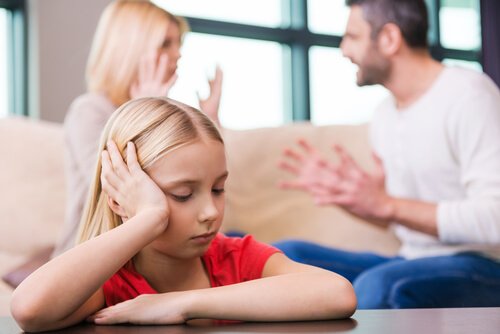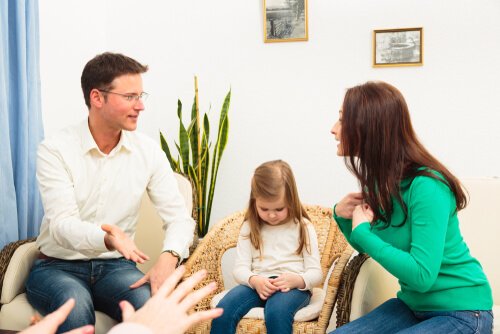How to Tell Your Children About Your Separation?

Going through a separation or divorce is a very difficult experience for both children and parents. Consequently, one of the most complicated moments is sharing the news about your separation with your children. This news can generate a whole range of emotions such as anger, sadness, pain, guilt and fear.
Telling your children about your separation is difficult since as a mother, you’re obviously concerned about how they’ll react.
The key is to break the news in a simple way. You should also assure your children, listen and help them overcome the event. If you apply some of these essential principles, telling your children about your separation can be a much more bearable experience.
How to tell your children about your separation?
Use simple words
The key message that your children will have to understand is that as parents you’ve made the decision to divorce since you’re not happy together. Make your children know that staying together will affect the family negatively.
Let your children know that it’s more pleasant to live together in the same house when there is love. However, when there is a bad relationship, cohabitation is no longer possible.
You must also let your children know that unlike relationships of love, family ties last a lifetime.
Choose the right moment to tell them
If your separation is still uncertain, it doesn’t make sense to talk to the children since they may get upset. Children at times don’t understand a thing, they may even feel responsible for the situation.
Keep in mind that children tend to develop a feeling of impotence and later of guilt when it comes to parental separation.

When the decision has already been made however, it should be communicated to the children promptly. Under no circumstances should your children be allowed to find out about the news in an accidental way.
You have to be honest and you must also take your child’s age into consideration when you decide to reveal the separation. Younger children need less detailed information, older children on the other hand will want to know all kinds of details.
In any case, it’s very important to say things in the simplest way possible and to give the news when the whole family is present, regardless of the age of your children.
Both younger and older children have the right to hear the news. The shared knowledge of the situation will help them cope better.
“Where there is marriage without love, there will be love without marriage.”
–Benjamin Franklin–
Reassure your children
Children usually feel responsible for parental separation. Therefore, you must assure your children that the decision has nothing to do with them. Children aren’t to blame in any way.
Little ones tend to believe that if parents don’t love each other anymore that they won’t be loved either. It’s important to let your children know that you aren’t divorcing them.
It’s essential to reassure your children about how much you love them. Assure your children that they’ll grow up surrounded by their parents. Your children should know that they’ll have full maternal and paternal support.
Children need to know that parents will continue to be responsible for their education. Parents will also continue to make joint decisions. Therefore, explain to your children that they’ll be able to see both father or mother as often as they need to.
Finally, as parents you need to agree on the organization of the children before announcing the separation. If there are still disagreements over custody, it’s best to wait before breaking the news.

Wait for reactions
The decision to separate wasn’t made by your child. Children have every right to externalize anger, sadness and pain. The reactions to separation will vary according to the child’s age.
For example, children under the age of five usually don’t understand the situation. Young children may even believe that their parents are trying to hurt them.
Children may also experience a regression in language, autonomy, eating disorders and problems sleeping. Older children may experience fear of abandonment and problems socializing and adapting.
When it comes to teenagers, they may experience more serious problems. They’re even more likely to harm themselves.
Therefore, it’s important for parents to be attentive to what their children say. Don’t minimize your children’s feelings nor avoid the subject.
On the contrary, offer answers to all of your children’s questions and concerns. You must maintain open dialogue and respect for their emotions.
In conclusion, rejection that children feel towards parental separation can be caused by the reaction that they observe from their parents.
If parents think positively about the separation process, it will be less dramatic for the little ones. Your children will be more trusting of their capacity to adapt.
All cited sources were thoroughly reviewed by our team to ensure their quality, reliability, currency, and validity. The bibliography of this article was considered reliable and of academic or scientific accuracy.
- Amato, P.; Keith, B. (1991). Parental divorce and the well-being of children: A meta-analysis. Psychological-Bulletin, 1991 Jul; 110 (1): 26-46
- Caplan, G. (1993). Prevención de los trastornos psicológicos en los hijos de padres divorciados. En: Caplan, G. Aspectos preventivos en salud mental. Barcelona: Paidós.
- Garin, P. B. (1992). Un análisis exploratorio de los posibles efectos del divorcio en los hijos. Psicothema, 4(2), 491-511.
- Salvador, G. P., & Del Barrio, V. (1995). El efecto del divorcio sobre la ansiedad de los hijos. Psicothema, 7(3), 489-497. https://www.redalyc.org/pdf/727/72707302.pdf
- Shaw, D. (1991) The Effects of divorce on children’s adjustment. Behavior Modification, 15(4), 456-485.
- Testor, C. P., Pujol, M. D., Vidal, C. V., & Alegret, I. A. (2009). El divorcio: una aproximación psicológica. Universidad Ramon Llull, 2, 39-46. https://www.researchgate.net/profile/Carles_Testor/publication/242775375_El_divorcio_una_aproximacion_psicologica/links/54e43ae50cf282dbed6ea7ba/El-divorcio-una-aproximacion-psicologica.pdf